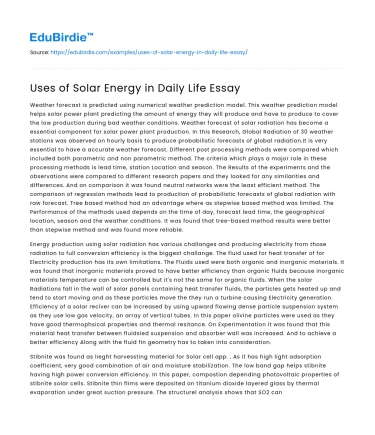Introduction
Solar energy, an inexhaustible source of power, stands at the forefront of renewable energy solutions. As global energy demands rise and environmental concerns intensify, solar energy provides a sustainable alternative to fossil fuels. Its applications extend beyond large-scale solar farms, permeating daily life in diverse and innovative ways. The increasing integration of solar technology in homes, transportation, and small-scale devices underscores its versatility and potential to revolutionize energy consumption. This essay explores the manifold uses of solar energy in daily life, examining its impact on household energy, transportation, and portable devices. By addressing common counter-arguments regarding efficiency and cost, the discussion will highlight the transformative role of solar energy in fostering sustainable living.
Transitioning from traditional energy sources to solar power not only offers environmental benefits but also provides economic advantages. For instance, a study by the International Renewable Energy Agency (IRENA) demonstrates that solar power can significantly reduce household energy expenses (IRENA, 2020). As we delve into specific applications, it becomes evident that solar energy is not merely an alternative but a pivotal component of a sustainable future.
Save your time!
We can take care of your essay
- Proper editing and formatting
- Free revision, title page, and bibliography
- Flexible prices and money-back guarantee
Household Solar Energy Applications
Solar energy in households primarily manifests through photovoltaic (PV) solar panels that convert sunlight into electricity. This technology offers a sustainable solution for reducing dependency on grid-based electricity. According to the Solar Energy Industries Association (SEIA), residential solar installations have surged by over 60% in the last decade, fuelled by decreasing costs and improved efficiency (SEIA, 2021). Homeowners are increasingly adopting solar panels to power household appliances, lighting, and heating systems, thus significantly reducing their carbon footprint.
Solar water heaters represent another prevalent household application. These systems utilize solar collectors to heat water, offering an energy-efficient alternative to conventional electric or gas water heaters. The U.S. Department of Energy states that solar water heaters can reduce water heating bills by 50% to 80% (DOE, 2021). This not only results in cost savings but also diminishes the reliance on non-renewable energy sources.
Despite the apparent advantages, some critics argue that the initial installation cost of solar panels and water heaters can be prohibitive. However, the long-term savings and government incentives, such as tax credits and rebates, often outweigh these initial expenses. Moreover, advancements in solar technology are continually driving costs down, making solar energy more accessible than ever. Transitioning to solar-powered homes thus represents a viable strategy for achieving energy independence and mitigating environmental impact.
Solar Energy in Transportation
The transportation sector, a major contributor to greenhouse gas emissions, is increasingly turning to solar energy as a solution. Solar-powered vehicles, including cars and buses, have emerged as innovative alternatives to traditional fuel-powered transportation. Companies like Lightyear and Sono Motors are pioneering solar-integrated electric vehicles (EVs), which utilize solar panels to extend their range and reduce reliance on charging infrastructure (Lightyear, 2022).
Public transportation systems are also exploring solar energy applications. For example, solar-powered buses are being implemented in cities worldwide, such as Shenzhen, China, which has fully electrified its bus fleet with solar energy support (Shenzhen Bus Group, 2021). These buses not only reduce emissions but also lower operational costs, demonstrating the feasibility of solar energy in mass transit systems.
While solar vehicles present a promising future, skeptics point out the limitations of current technology, such as limited energy storage capacity and higher production costs. However, ongoing research and development in solar cells and battery technologies are expected to address these challenges. As innovations continue to evolve, the integration of solar energy in transportation stands to significantly reduce carbon emissions and promote sustainable urban mobility.
Portable Solar-Powered Devices
In addition to large-scale applications, solar energy is increasingly being harnessed in portable devices, offering convenience and sustainability. Solar-powered chargers and power banks have become popular among consumers seeking eco-friendly alternatives for charging electronic devices. These devices capture solar energy through small photovoltaic panels, providing a renewable power source for smartphones, tablets, and other gadgets.
Moreover, solar energy is being utilized in outdoor and remote settings where access to conventional power sources is limited. Solar lanterns and portable solar cookers are widely used in developing regions, providing affordable and sustainable solutions for lighting and cooking needs. According to a report by the Global Off-Grid Lighting Association, solar lanterns have improved the quality of life for over 100 million people in off-grid areas (GOGLA, 2020).
Critics may argue that the efficiency of portable solar devices is contingent on weather conditions and sunlight availability. However, technological advancements are enhancing the efficiency and storage capacity of these devices, making them increasingly reliable. The widespread adoption of portable solar technology exemplifies the expanding role of solar energy in everyday life, promoting sustainable practices on an individual level.
Conclusion
In conclusion, the applications of solar energy in daily life are both diverse and transformative, spanning household energy use, transportation, and portable devices. The integration of solar technologies not only offers environmental benefits by reducing carbon emissions but also provides economic advantages through cost savings and energy independence. While challenges such as initial costs and technological limitations exist, ongoing advancements and supportive policies are paving the way for broader adoption.
As societies worldwide navigate the transition to sustainable energy systems, solar energy emerges as a vital component of this journey. Its versatility and potential to address pressing environmental issues underscore its significance in shaping a sustainable future. By embracing solar energy in everyday applications, individuals and communities can contribute to a greener, more sustainable world.






 Stuck on your essay?
Stuck on your essay?

